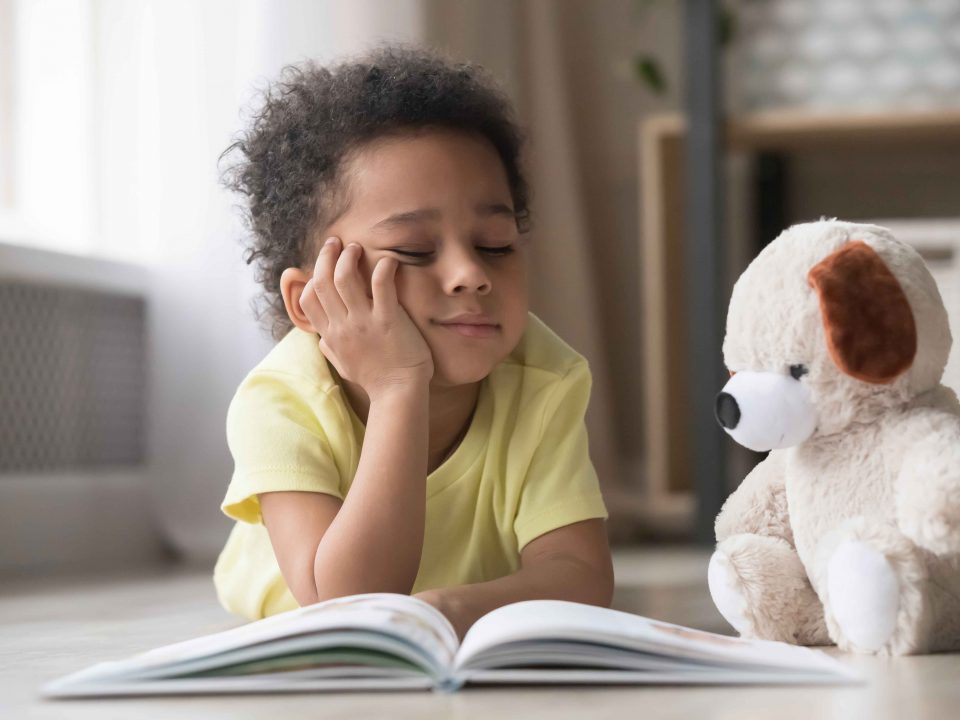
Getting kids to bed early and making them stay there long enough to have a good night’s sleep takes a lot of effort. But the extra effort is worth it. Here’s why.
Recognizing sleep deprivation in kids
When kids sleep, processes take place in the brain and other areas of the body that support growth, health, memory and cognitive development.
Information is solidified and stored in the long-term memory, human growth hormone is released, blood flow is sent to muscles to restore energy, broken-down tissues are rebuilt and nerve cells are rewired.
Kids who don’t get enough sleep are often irritable, forgetful and have difficulties with emotional regulation. But it’s not always obvious when a child is sleep-deprived. Some might just fall asleep on the way home from school, and their parents don’t realize it’s not normal to need a nap past the age of five.
Other kids, especially toddlers and preschoolers, don’t look sleepy at all—they actually get wound up and hyperactive when they’re sleep-deprived. “Parents say, ‘He doesn’t look tired—I’ll keep him up,’” says Hall. Unfortunately, this can compound the problem.
One of the most concerning culprits of sleep derailment in modern times is far more inconspicuous: the rise of screens. The blue light emitted by tablets and smartphones interferes with the release of melatonin, a hormone the body produces to signal bedtime.
That’s why experts recommend kids and adults turn off screens one to two hours before bed. But even screen use earlier in the day could interfere with sleep. A 2017 study of kids who were six months to three years old found that, for every additional hour a child spent on a touchscreen during the day, they got almost 16 minutes less sleep. More screen time was also associated with having difficulty falling asleep.
Parents often justify their kids’ screen use by recalling that they watched TV and played video games when they were younger, but the devices kids use today are different. “It’s much more interactive now, with bright, fancy movements, and kids are constantly swiping from this activity to that activity,” says Michelle Ponti, a paediatrician in London, Ont., and the chair of the Canadian Paediatric Society’s Digital Health Task Force. “The child’s brain is constantly having to make sense of all those visuals.”
Those über-stimulating screens are also taking away time from other activities, like exercise and reading, that are conducive to a good night’s sleep.
With all the obstacles getting in the way of proper slumber, many parents find themselves in a sleep crisis.
The long-term effects of sleep deprivation in kids
The effects of poor sleep aren’t just evident the next day—they can also impact long-term health.
Studies have shown that kids who are sleep-deprived run a higher chance of being overweight or obese. They are also at risk of high blood pressure and more prone to
accidents, like falling off the monkey bars or their bikes.
A study published in the journal Paediatrics in August 2019, by researchers at the CHEO Research Institute in Ottawa, found kids who don’t get enough sleep (and spend too much time on screens) are more likely to act impulsively and make poorer decisions.
Kids who aren’t well-rested are also more forgetful, irritable and likely to engage in risk-taking behaviour, particularly as teens, and are more likely to have suicidal thoughts. School work often suffers, says Hall.
Not getting enough sleep can make it difficult to focus and affects the brain’s ability to consolidate and remember what was learned during the day.
Sleep and ADHD
One area that warrants particular consideration by parents and doctors, say experts, is the complex interplay between sleep and ADHD. It’s been well-established that kids with ADHD often have trouble falling asleep and staying asleep, which can be made worse by their medications, which are stimulants. Some researchers have even theorized that ADHD is actually a circadian rhythm disturbance, characterized by lack of sleep at night and behavioural challenges during the day.
At the same time, not getting enough sleep can cause impulsivity, inattention and problems regulating emotions—all signs of ADHD.
But it’s important to note that a lack of sleep itself does not cause ADHD. “I think some professionals are a little worried that some of the indications of inadequate sleep could, if someone is not looking at sleep as a possible culprit in the situation, lead people to say, ‘Oh, your kid probably has ADHD—let’s put them on meds,’” says Hall.
Ponti says more and more kids coming into her clinic are running on fumes. These children are often dealing with behavioural, neurodevelopmental or learning challenges, and it’s only after probing that she discovers they aren’t getting enough sleep. “I take a very thorough family history and then do a complete physical examination to rule out other conditions,” says Ponti. If she thinks a child might have a sleep disorder, like sleep apnea, she refers the patient to a sleep specialist. “You would hate to miss sleep apnea and treat them like they have ADHD,” she says.
Is Sleep Affecting Behaviour?
To try to suss out on your own whether your kid’s behaviour or emotional dysregulation is due to lack of sleep or something else, you could look at whether they perform or behave better on the weekend, when they don’t have to get up early for school. Or, make a concerted effort to increase the amount of sleep your kid gets for a week or two, and see if the behaviour improves.
Source: Today’s Parent
Discovery Point Nursery and Academy
Daycare in Woodbridge Vaughan